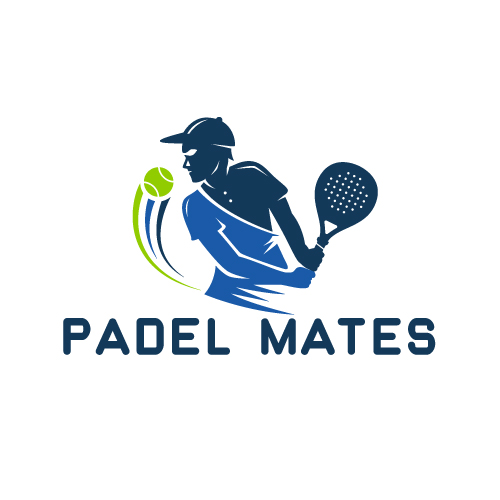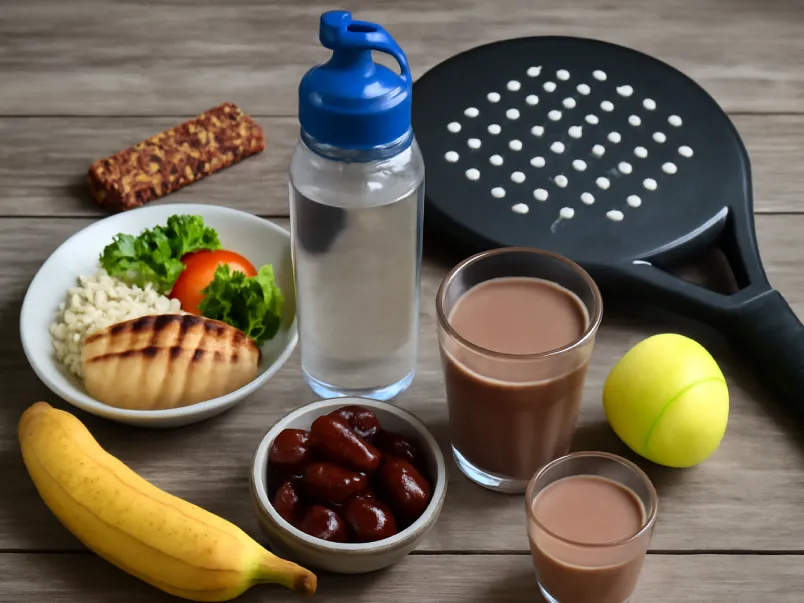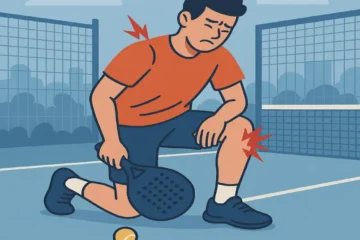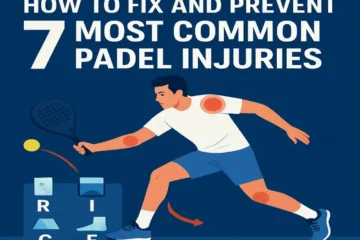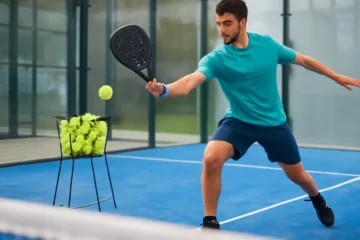Padel is a fast-paced sport that requires both stamina and quick bursts of energy. Whether you’re a recreational player or a club-level competitor, your performance on the court is not only dependent on your skills and fitness, but also on what you fuel your body with before, during, and after the match. In this ultimate guide, we’ll break down the importance of nutrition and hydration for padel players, offering practical advice on what to eat and drink to optimize performance and recovery.
The Importance of Nutrition for Padel Players
Imagine you’re deep into a match, feeling on top of your game when suddenly, you hit a wall. Your legs feel heavy, your reaction time slows, and you’re struggling to catch your breath. The culprit? Likely, inadequate nutrition or hydration.
Nutrition plays a crucial role in your athletic performance. The right food can give you energy to power through your match, while the wrong food can leave you sluggish and drained. In padel, your body needs to perform high-intensity bursts followed by brief recovery periods, and this pattern requires a balance of carbohydrates, proteins, fats, and hydration.
In this guide, we’ll dive into the science behind fueling for padel, how to prepare your body before a match, maintain energy levels during play, and recover faster afterward.
Part 1: The Science of Fueling for Padel
Before we dive into specific food recommendations, it’s essential to understand why nutrition is so important for padel players. The demands of the sport are unique, and your body requires a combination of nutrients to perform at its best.
The Demands of Padel
Padel is a dynamic sport that requires short, explosive bursts of energy. From quick sprints to powerful smashes and volleys, padel demands both quick and sustained energy. This means that both your aerobic (endurance) and anaerobic (explosive) systems need to be supported. Your muscles rely on stored energy (glycogen) for quick movements, and maintaining focus and concentration throughout a match requires stable blood sugar levels.
Padel also involves a lot of lateral movements, quick pivots, and high-impact actions, making muscle repair and recovery especially important. Therefore, a well-rounded approach to nutrition, providing your muscles with the right fuel for both energy and repair, is crucial.
The Role of Macronutrients
- Carbohydrates: The primary fuel for your muscles and brain during exercise, carbohydrates are essential for high-intensity efforts like sprinting and smashing. Carbs are broken down into glucose, which is used by your muscles for energy. A depletion of glycogen (your body’s stored carbs) can lead to fatigue and decreased performance.
- Protein: While carbs fuel your muscles during the game, protein is the key to repairing them afterward. Protein aids in muscle recovery and helps you bounce back faster, reducing soreness and promoting tissue repair.
- Fats: While fats are not immediately available for quick bursts of energy, they are an important secondary fuel source for sustained energy. Including healthy fats in your diet helps ensure that you have adequate long-lasting energy throughout the match.
- Hydration: Dehydration can impair your performance drastically. Even mild dehydration can cause reduced coordination, sluggishness, and fatigue. Proper hydration helps regulate body temperature, maintain energy, and improve focus. It is critical to drink enough water before, during, and after your match.
Part 2: Pre-Match Nutrition: Fueling for Performance
Proper fueling before a match ensures that you start with full energy reserves and are primed for optimal performance. The key is to eat the right foods at the right time.
Timeline is Everything
3-4 Hours Before: The Ideal Main Meal
The main pre-match meal should focus on providing your body with a balanced supply of carbohydrates, lean protein, and low-fat, easy-to-digest options. This meal should leave you feeling satisfied but not sluggish.
What to eat:
- Carbohydrates: Brown rice, quinoa, pasta, or sweet potatoes
- Protein: Grilled chicken, lean turkey, or fish
- Fats: Small amounts of olive oil, avocado, or nuts
- Example Meals:
- Grilled chicken with rice and steamed vegetables
- Tuna sandwich on whole-grain bread
- Pasta with lean meatballs in tomato sauce
1-2 Hours Before: The Top-Up Snack
By this time, your main meal is already being digested, and you need a snack to top off your energy stores. The goal here is to consume easily digestible carbohydrates that can quickly convert to glucose and provide a quick energy boost.
What to eat:
- A banana
- A slice of toast with jam
- An energy bar
- A small pot of rice pudding
30-60 Minutes Before: The Final Boost (If Needed)
If you’re feeling like you need a quick energy boost, consume fast-digesting carbs right before the match. These foods provide immediate energy, without weighing you down.
What to eat:
- A handful of dried fruit
- A small energy gel
- A small sports drink
Hydration Before the Match
Hydration is essential, especially when playing a high-intensity sport like padel. Aim to drink around 500ml of water 2-3 hours before the match to ensure adequate hydration levels. Sip another 250ml 20-30 minutes before stepping on the court.
What to Avoid Pre-Match
Avoid foods that can slow digestion or cause discomfort during the match. These include:
- High-fat foods like fried items or creamy sauces
- High-fiber foods, which may cause bloating (e.g., beans or large salads)
- Excessive protein (shakes or large steaks)
- Sugary sodas and any new, unfamiliar foods
Part 3: Fueling During the Match
For matches lasting longer than 60-90 minutes, it’s important to maintain your energy levels and hydration to avoid a drop in performance.
Hydration During the Match
Sip water during changeovers to stay hydrated. If your match lasts longer or is particularly intense, a sports drink with electrolytes can help replenish lost minerals like sodium and potassium. This is especially important in hot conditions or after extended rallies.
Nutrition During the Match
To maintain energy levels, consume quick, easily digestible carbohydrates. This will help replenish glycogen stores and keep you feeling energized.
Examples of snacks:
- A banana
- Energy gels
- Dates
- A small sports drink
Part 4: Post-Match Nutrition: The Recovery Window
Post-match nutrition is just as important as pre-match fueling. In the 30-60 minutes after your match, your muscles are especially receptive to nutrients that aid in recovery. This is known as the “Golden Window,” where the body is primed to absorb nutrients to repair and refuel.
The 30-60 Minute “Golden Window”
The muscles are most capable of absorbing nutrients immediately after exercise. During this period, the body needs carbohydrates to replenish glycogen stores and protein to repair muscle fibers. Ideally, consume a 3:1 or 4:1 ratio of carbs to protein.
Excellent Post-Match Meals & Snacks
- Quick Options (immediately after the match):
- Chocolate milk (provides carbs and protein)
- A recovery shake with protein and carbs
- A banana with protein yogurt
- Proper Meal (within 2 hours):
- Grilled salmon with sweet potatoes and greens
- Chicken stir-fry with rice and vegetables
- Whole-wheat wrap with lean turkey, avocado, and greens
Rehydration
After the match, continue sipping water to rehydrate. Weigh yourself before and after your match to determine fluid loss. For every 1kg of weight lost, aim to drink 1 liter of fluid. Including electrolytes in your recovery drink will help your body retain the fluids better.
Part 5: Sample Meal Plans for a Match Day
Planning your meals around your match time ensures that you’re fueling your body at the right intervals. Here are two scenarios that illustrate ideal meal planning for match day.
Scenario 1: Morning Match (10:00 am start)
- Breakfast (7:00 am): Oatmeal with berries and a scoop of protein powder.
- Pre-Match Snack (9:15 am): A banana.
- Post-Match (12:00 pm): Scrambled eggs on whole-wheat toast with avocado.
Scenario 2: Evening Match (7:00 pm start)
- Lunch (1:00 pm): Pasta with chicken and a light pesto sauce.
- Pre-Match Snack (5:30 pm): A rice cake with peanut butter and honey.
- Post-Match (9:00 pm): A smoothie with Greek yogurt, fruit, and spinach on the way home, followed by a proper dinner.
Conclusion
Proper nutrition and hydration are crucial to maintaining your performance on the padel court. By fueling your body with the right nutrients before, during, and after a match, you can ensure that you have the energy to perform your best and recover quickly.
Remember, nutrition is not one-size-fits-all. Experiment with different foods and timing to find what works best for your body. With proper fueling, you can elevate your padel game and experience enhanced energy, power, and consistency.
Just as you dedicate time to perfecting your technique, investing in your nutrition will give you a competitive edge. Treat your body like a high-performance machine, and it will reward you with increased stamina, quicker recovery, and more powerful performances on the padel court.
FAQ: Padel Nutrition – Your Most Common Questions Answered
1. What should I eat before a padel match?
Eating a balanced meal 3-4 hours before your match is key. Opt for complex carbohydrates, lean protein, and healthy fats. Examples include grilled chicken with rice, pasta with lean meatballs, or a tuna sandwich on whole-grain bread. A snack 1-2 hours before the match, like a banana or an energy bar, can provide an additional energy boost.
2. How much water should I drink before a match?
It’s important to hydrate well before the match. Aim for 500ml of water 2-3 hours before the match and sip another 250ml 20-30 minutes before you step on the court. Stay hydrated during the match by sipping water during changeovers.
3. What should I eat during a padel match?
During longer matches, opt for quick, easily digestible carbohydrates like bananas, energy gels, or dates to keep your energy levels up. A sports drink with electrolytes is also a good option to replenish lost fluids and minerals.
4. When should I eat after a match?
Post-match recovery is crucial within 30-60 minutes after the match. Focus on a 3:1 or 4:1 ratio of carbohydrates to protein to replenish glycogen and repair muscles. Good options include chocolate milk, a recovery shake, or a banana with protein yogurt.
5. How do I know if I’m eating the right amount of food for padel?
Each player’s nutrition needs may vary. Start by following general guidelines and experiment with timing, portions, and types of food. Listen to your body—if you feel energized and recover well, you’re on the right track.
6. Can I eat a lot of protein before my match?
It’s better to avoid heavy protein meals right before your match. Too much protein can make digestion slow and may cause discomfort during high-intensity play. Stick to a balanced meal with a focus on carbohydrates and lean protein 3-4 hours before the match.
7. What are the best post-match recovery foods?
Focus on foods that include both carbs and protein. Chocolate milk, a smoothie with protein powder, or a chicken stir-fry with rice are great options. Rehydrate thoroughly by drinking water and including electrolytes.
